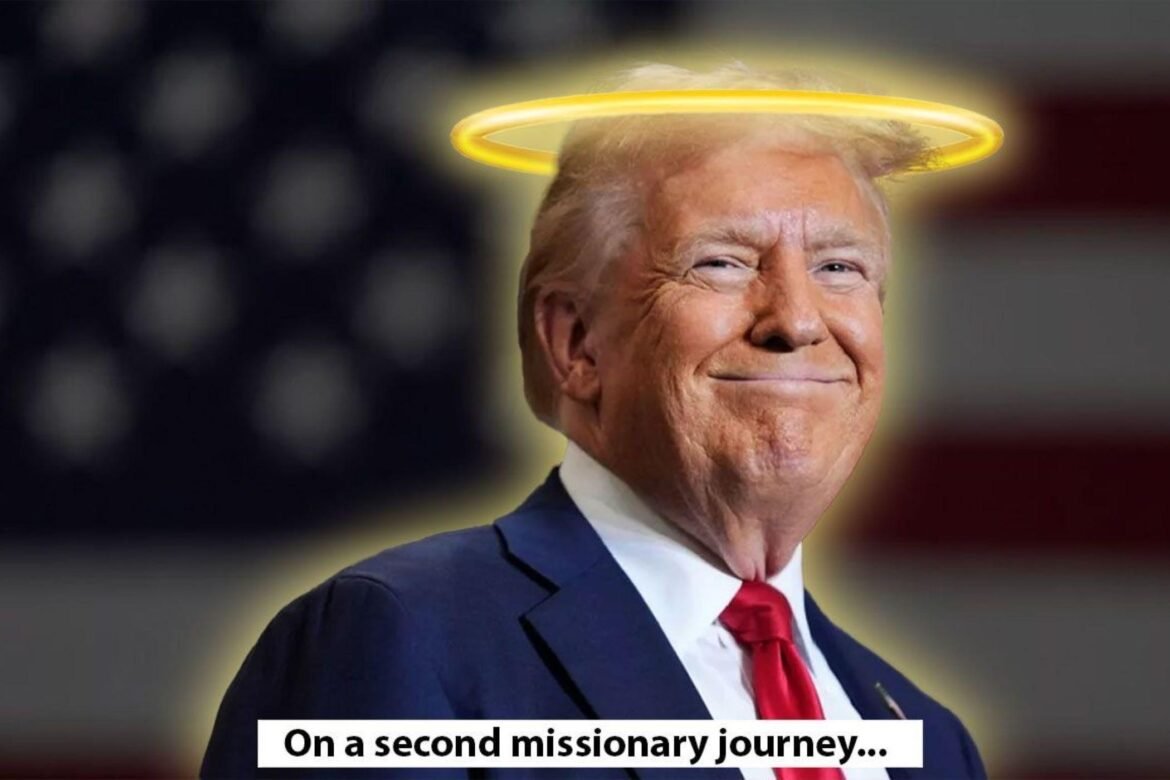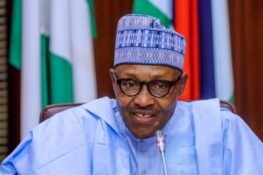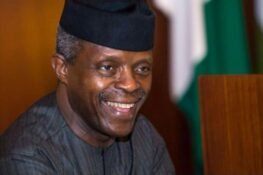You know there’s trouble when communist China tweets that America should act to protect capitalism.
The Asian giant is hurting from President Donald Trump’s mission to extract gains through aggressive negotiation tactics against other countries.
The world economic order is in turmoil because of one powerful actor.
The canary that the miners depend on for safety is sick.
In just one week of US tariffs, the American stock market lost $6 trillion in value, while international trade faced severe disruption – and Trump is not backing down.
He has announced tariffs of up to 104% on Chinese imports in retaliation.
The billionaire class, which has been staunchly behind the US President, expressed alarm as the market plunged.
It is not just the CEO of Blackrock, the largest money-managing firm in the world, Larry Fink, a Trump supporter, who voiced concerns.
Elon Musk, the richest man in the world, pleaded with Trump, who reportedly played golf while financial markets tumbled.
Who shouldn’t have seen that Trump would do this, except the greedy and the short-sighted?
When Donald Trump first campaigned for the presidency in 2016, protectionist trade policies formed a cornerstone of his economic platform.
It should not have been surprising that when Trump returned to the White House in January 2025, an expansion of this approach to tariffs would be his guiding principle.
His voters who now complain need to question their intelligence and judgement. He said it and he is doing it.
Trump’s tariff philosophy stems from core beliefs: that trade deficits represent significant economic losses for America, previous administrations struck unfavourable deals, and aggressive tariffs could extract concessions from trading partners.
This stance has always been his personal conviction, right or wrong, running contrary to American economic policy since the Bretton Woods institutions were introduced after World War II.
What sets Trump’s tariffs apart from those of previous US administrations is their scope, unpredictability, shifting positions, and varying justifications.
They are implemented as if nations are corporations that Trump is used to dealing with as a businessman, reflecting a transactional bargaining style without consistent economic principles.
China has received the brunt of Trump’s policy focus, but there are no consistent exceptions in Trump’s approach. Europe, Mexico, Canada, Botswana, Lesotho, Vietnam, even tiny Norfolk Island and remote islands have been targeted by the US President.
With only a few nations unaffected by Trump’s policy decisions, developing nations are facing potential headwinds.
The expansive tariff regime is causing significant disruptions to global trade flows and established supply chains that evolved over decades of relative openness.
These disruptions carry severe economic risks for both the global economy and individual nations.
Tariffs have accelerated supply chain restructuring, compelling companies to reassess their production locations and sourcing strategies.
This is also generating a multiplier effect, increasing the economic impact across various sectors.
Additionally, nations are experiencing inflationary pressures that complicate monetary policy and erode the rules-based international trading system.
The World Trade Organization (WTO), already under strain, faces further weakening due to unilateral tariff actions justified by questionable security exceptions. This has removed predictability from global trade.
In Nigeria, the impact of a 14% tariff on imports has been immediate.
Nigerian stocks recorded their biggest drop in recent times, as investors lost about N659 billion at the close of trading at the beginning of the week.
Crude oil prices quickly weakened, declining by over 12%, causing the Central Bank of Nigeria (CBN) to sell $198 million to strengthen the naira.
Economist Bismarck Rewane told Channels Television’s Business Morning that uncertainties and the fears of recession have become very palpable with the imposition of tariffs on Nigeria’s exports to the United States.
The Federal Government also raised concerns over the potential negative consequences of U.S. tariffs.
The key lesson here is that tariff wars rarely yield winners; while they may temporarily benefit specific industries shielded from competition, the overarching economic damage wrought by reduced trade, higher prices, and retaliatory actions typically outstrips these narrow advantages
Minister of Industry, Trade and Investment, Dr. Jumoke Oduwole, warned that the move could significantly impact both oil and non-oil trade flows.
The Trump administration is clearly using tariffs to compel Nigeria and other countries to open their markets to American goods.
For instance, the US Trade Representative criticised Nigeria’s import ban on 25 categories of goods, claiming that the restrictions limit market access for American exporters.
It seems Donald Trump cannot learn lessons from one of the most infamous trade policies in American history – the Smoot-Hawley Tariff Act of 1930. Signed into law by US President Herbert Hoover, the legislation imposed record-high tariffs.
The consequences of Smoot-Hawley were disastrous. U.S. imports plummeted by 66% between 1929 and 1933, while exports shrank by 61%. International trade collapsed, exacerbating the economic downturn and intensifying the Great Depression.
The parallels are striking.
Just like today, the Hoover tariff soured diplomatic relations.
Both Trump and Hoover based their campaigns on protectionist policies aimed at shielding American industries.
The key lesson here is that tariff wars rarely yield winners; while they may temporarily benefit specific industries shielded from competition, the overarching economic damage wrought by reduced trade, higher prices, and retaliatory actions typically outstrips these narrow advantages.
While much attention is focused on major economies like China, Canada, and the European Union, developing nations like Ghana, Madagascar and Vietnam will also suffer because they will find it more difficult to diversify or bargain.
For countries like Nigeria, the tariff regime presents significant challenges.
First, they heavily rely on preferential access to developed markets, which diminishes in value. Programs like the Generalised System of Preferences (GSP), giving developing countries special access to American markets, lose their effectiveness when overall tariff rates increase.
Secondly, many developing nations occupy roles as components within global supply chains rather than end-market producers.
When tariffs disrupt these supply chains, production can shift rapidly, exposing businesses to sudden changes.
Thirdly, many developing economies depend on commodity exports sensitive to fluctuations in the global economy.
Tariff-induced contractions will have a major impact, and they will be rendered vulnerable as larger economies engage in trade disputes.
As Africa’s largest economy, Nigeria faces specific challenges and opportunities in the existing trade environment.
Although Nigeria’s economic relationship with the U.S. is less prominent than its ties to the EU and China, it remains significant, particularly in select sectors.
Historically, Nigeria’s exports to the U.S. have been dominated by petroleum, comprising over 95% of total U.S. exports in many years.
However, ongoing diversification efforts have spurred interest in expanding non-oil exports such as agriculture, textiles, and manufactured goods – areas that are now threatened by rising tariff barriers.
However, Nigeria’s ability to leverage opportunities hinges on resolving persistent challenges in infrastructure, regulatory consistency, and the overall business climate
.
The African Growth and Opportunity Act (AGOA), which assures duty-free access for thousands of products to the U.S. market, has been a critical framework for Nigerian exports. Tariffs will quickly undermine such preference programs.
As a major oil exporter, Nigeria’s economic stability is more threatened than many other countries in Africa.
Tariffs will affect oil prices, government revenues, currency rates, and the stock market.
Some analysts believe Africa and other developing economies must not just fold their arms but move to take advantage of opportunities in supply chain shifts that U.S.-China tensions can offer. Chinese companies may begin to manufacture in nations that enjoy better tariff treatment with America.
However, Nigeria’s ability to leverage opportunities hinges on resolving persistent challenges in infrastructure, regulatory consistency, and the overall business climate.
While labour costs may be competitive, logistics costs and corruption have historically hampered Nigeria’s competitiveness in global markets.
To navigate this emerging trade landscape, Nigerian policymakers and business leaders need balanced defensive and offensive strategies.
Defensively, diversifying export markets beyond countries embroiled in tariff conflicts can mitigate vulnerabilities.
Offensively, recognising and promoting sectors where Nigeria holds comparative advantages could facilitate export growth in the shifting global landscape.
The expanded Trump tariff regime signifies a radical deviation from the trade consensus that has underpinned global economic integration for years.
Characterised by inconsistent application, erratic justifications, and use as a negotiating tactic rather than a sound economic instrument, it has introduced unprecedented uncertainty into global markets and every nation has to adjust, including Nigeria.
Clearly, the era of steady global economic integration under consistent rules has entered a phase of reevaluation.
How nations approach this transition will dramatically influence economic prospects.
For developing nations like Nigeria, the stakes are elevated. Yet the shifting global supply chains also present viable opportunities for countries ready to exploit them.
The canary may be sick, but Nigeria may be able to capitalise on the change through visionary leadership.








